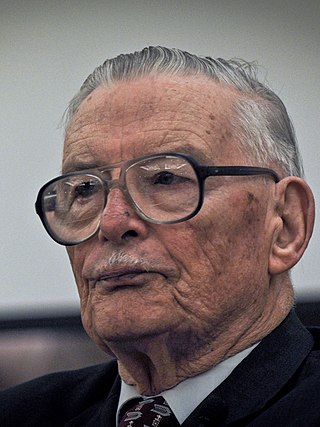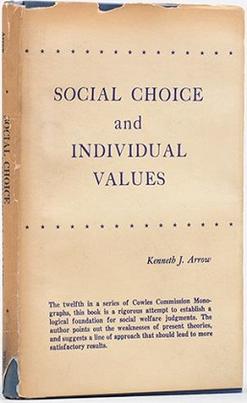Logrolling is the trading of favors, or quid pro quo, such as vote trading by legislative members to obtain passage of actions of interest to each legislative member. In organizational analysis, it refers to a practice in which different organizations promote each other's agendas, each in the expectation that the other will reciprocate. In an academic context, the Nuttall Encyclopedia describes logrolling as "mutual praise by authors of each other's work". Where intricate tactics or strategy are involved, the process may be called horse trading.
In welfare economics, a Pareto improvement formalizes the idea of an outcome being "better in every possible way". A change is called a Pareto improvement if it leaves everyone in a society better-off. A situation is called Pareto efficient or Pareto optimal if all possible Pareto improvements have already been made; in other words, there are no longer any ways left to make one person better-off, without making some other person worse-off.
Public choice, or public choice theory, is "the use of economic tools to deal with traditional problems of political science." It includes the study of political behavior. In political science, it is the subset of positive political theory that studies self-interested agents and their interactions, which can be represented in a number of ways—using standard constrained utility maximization, game theory, or decision theory. It is the origin and intellectual foundation of contemporary work in political economy.

James McGill Buchanan Jr. was an American economist known for his work on public choice theory originally outlined in his most famous work, The Calculus of Consent, co-authored with Gordon Tullock in 1962. He continued to develop the theory, eventually receiving the Nobel Memorial Prize in Economic Sciences in 1986. Buchanan's work initiated research on how politicians' and bureaucrats' self-interest, utility maximization, and other non-wealth-maximizing considerations affect their decision-making. He was a member of the Board of Advisors of The Independent Institute as well as of the Institute of Economic Affairs, a member of the Mont Pelerin Society (MPS) and MPS president from 1984 to 1986, a Distinguished Senior Fellow of the Cato Institute, and professor at George Mason University.
Arrow's impossibility theorem is a key result in social choice, discovered by Kenneth Arrow, showing that no ranked voting rule can behave rationally. Specifically, any such rule violates independence of irrelevant alternatives (IIA), the idea that a choice between and should not depend on the quality of a third, unrelated option . The result is most often cited in election science and voting theory, where is called a spoiler candidate. In this context, Arrow's theorem can be restated as showing that no ranked voting rule can eliminate the spoiler effect.
In philosophy, economics, and political science, the common good is either what is shared and beneficial for all or most members of a given community, or alternatively, what is achieved by citizenship, collective action, and active participation in the realm of politics and public service. The concept of the common good differs significantly among philosophical doctrines. Early conceptions of the common good were set out by Ancient Greek philosophers, including Aristotle and Plato. One understanding of the common good rooted in Aristotle's philosophy remains in common usage today, referring to what one contemporary scholar calls the "good proper to, and attainable only by, the community, yet individually shared by its members."
The tyranny of the majority is an inherent weakness to majority rule in which the majority of an electorate pursues exclusively its own objectives at the expense of those of the minority factions. This results in oppression of minority groups comparable to that of a tyrant or despot, argued John Stuart Mill in his 1859 book On Liberty.
In social choice theory, the majority rule (MR) is a social choice rule that says that, when comparing two options, the option preferred by more than half of the voters should win.
The median voter theorem in political science and social choice theory, developed by Duncan Black, states that if voters and candidates are distributed along a one-dimensional spectrum and voters have single-peaked preferences, any voting method that is compatible with majority-rule will elect the candidate preferred by the median voter. The median voter theorem thus shows that under a realistic model of voter behavior, Arrow's theorem, which essentially suggests that ranked-choice voting systems cannot eliminate the spoiler effect, does not apply, and therefore that rational social choice is in fact possible if the election system is using a Condorcet method.

Gordon Tullock was an American economist and professor of law and economics at the George Mason University School of Law. He is best known for his work on public choice theory, the application of economic thinking to political issues. He was one of the founding figures in his field.
In the context of public economics, the term Government failure refers to an economic inefficiency caused by a government regulatory action, if the inefficiency would not have existed in a free market. The costs of the government intervention are greater than the benefits provided. It can be viewed in contrast to a market failure, which is an economic inefficiency that results from the free market itself, and can potentially be corrected through government regulation. However, Government failure often arises from an attempt to solve market failure. The idea of government failure is associated with the policy argument that, even if particular markets may not meet the standard conditions of perfect competition required to ensure social optimality, government intervention may make matters worse rather than better.
Social choice theory is a branch of welfare economics that analyzes methods of combining individual opinions, beliefs, or preferences to reach a collective decision or create measures of social well-being. It contrasts with political science in that it is a normative field that studies how societies should make decisions, whereas political science is descriptive. Social choice incorporates insights from economics, mathematics, philosophy, political science, and game theory to find the best ways to combine individual preferences into a coherent whole, called a social welfare function.

Kenneth Arrow's monograph Social Choice and Individual Values and a theorem within it created modern social choice theory, a rigorous melding of social ethics and voting theory with an economic flavor. Somewhat formally, the "social choice" in the title refers to Arrow's representation of how social values from the set of individual orderings would be implemented under the constitution. Less formally, each social choice corresponds to the feasible set of laws passed by a "vote" under the constitution even if not every individual voted in favor of all the laws.
The Virginia School of political economy is a school of economic thought originating at the Thomas Jefferson Center for Studies in Political Economy of the University of Virginia in the 1950s and 1960s. Some of its proponents established the Center for Study of Public Choice at Virginia Tech in 1969, moving it to George Mason University in 1983. The school focuses primarily on public choice theory, constitutional economics, and law and economics.
Public economics(or economics of the public sector) is the study of government policy through the lens of economic efficiency and equity. Public economics builds on the theory of welfare economics and is ultimately used as a tool to improve social welfare. Welfare can be defined in terms of well-being, prosperity, and overall state of being.
The concept known as rational irrationality was popularized by economist Bryan Caplan in 2001 to reconcile the widespread existence of irrational behavior with the assumption of rationality made by mainstream economics and game theory. The theory, along with its implications for democracy, was expanded upon by Caplan in his book The Myth of the Rational Voter.
Constitutional economics is a research program in economics and constitutionalism that has been described as explaining the choice "of alternative sets of legal-institutional-constitutional rules that constrain the choices and activities of economic and political agents". This extends beyond the definition of "the economic analysis of constitutional law" and is distinct from explaining the choices of economic and political agents within those rules, a subject of orthodox economics. Instead, constitutional economics takes into account the impacts of political economic decisions as opposed to limiting its analysis to economic relationships as functions of the dynamics of distribution of marketable goods and services.
The benefit principle is a concept in the theory of taxation from public finance. It bases taxes to pay for public-goods expenditures on a politically-revealed willingness to pay for benefits received. The principle is sometimes likened to the function of prices in allocating private goods. In its use for assessing the efficiency of taxes and appraising fiscal policy, the benefit approach was initially developed by Knut Wicksell (1896) and Erik Lindahl (1919), two economists of the Stockholm School. Wicksell's near-unanimity formulation of the principle was premised on a just income distribution. The approach was extended in the work of Paul Samuelson, Richard Musgrave, and others. It has also been applied to such subjects as tax progressivity, corporation taxes, and taxes on property or wealth. The unanimity-rule aspect of Wicksell's approach in linking taxes and expenditures is cited as a point of departure for the study of constitutional economics in the work of James Buchanan.
A major branch of social choice theory is devoted to the comparison of electoral systems, otherwise known as social choice functions. Viewed from the perspective of political science, electoral systems are rules for conducting elections and determining winners from the ballots cast. From the perspective of economics, mathematics, and philosophy, a social choice function is a mathematical function that determines how a society should make choices, given a collection of individual preferences.
In the study of voter behavior, the efficient voter rule speaks to the desirability of voter-driven outcomes. It applies to situations involving negative externalities such as pollution and crime, and positive externalities such as education. Related efforts to achieve socially optimal quantities of externalities have long been a focus of microeconomic research, most famously by Ronald Coase and Arthur Pigou. Externality problems persist despite past remedies, which makes newer approaches such as the efficient voter rule important.


